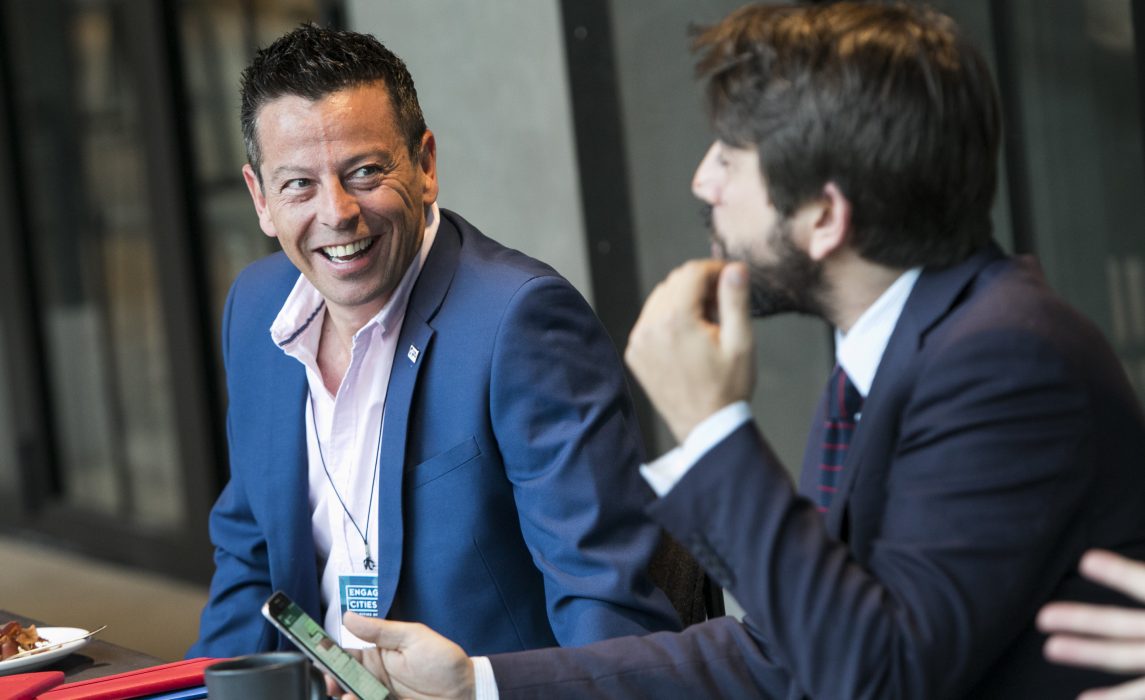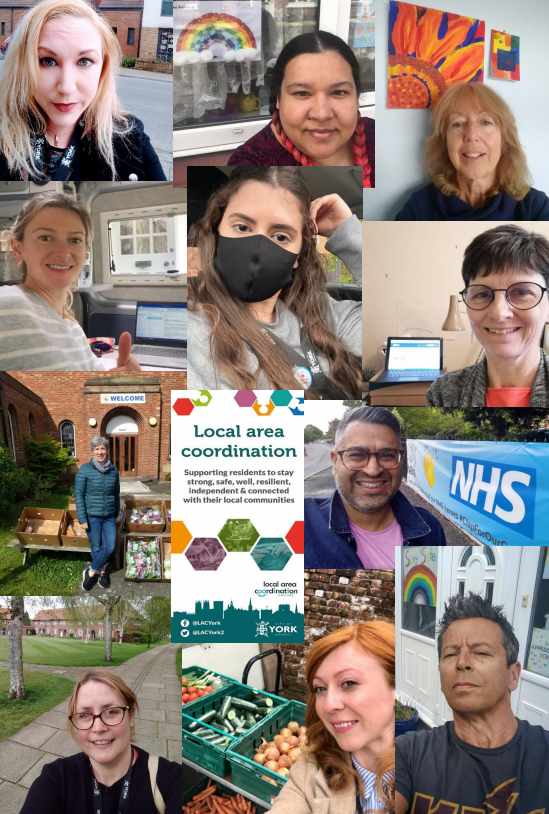
York’s ABCD journey – People Helping People
Power is shifting in York and people are increasingly coming together to define what they want and build more connected, caring and compassionate neighbourhoods and communities. People’s skills, gifts, talents and networks are being harnessed to provide self-sustaining solutions and a deep reservoir of community resources that people can draw upon to live well. A truly asset-based community development approach to building community and wellbeing. With a thirty-year history of sustained investment in community development, neighbourhood grants for social action and promoting active citizenship, York has strong foundations to build on.
More recently, the council’s Adult Social Care department has moved to a ‘strengths-based approach’ recognising its traditional social care services focussed too much on deficits and thresholds. Introduced in 2016 a new ‘community operating model’ has at its core; prevention, early intervention and asset-based community development. Tapping into the power of people and community as opposed to ‘service land’ and seeing ‘what’s strong not what’s wrong’. The principles of coproduction inform the model; seeing people as assets, recognising the core economy, building social networks and reciprocity.
This model supports the Council’s vision of creating the conditions needed for all people to enjoy healthy, active, independent lives. The city has deliberately aligned multiple initiatives and teams, to enable a force for system change, and a new normal. Shifting away from where social care intervenes at a point of crisis in peoples’ lives, often risking dependency, towards a new culture intervening upstream, maximising the individual’s agency and their community’s capacity to self-manage as the first option, encouraging active citizenship and voice. This is a more enabling, facilitative approach, reflecting collaborative leadership and shared purpose.
Together with the rich voluntary and community sector, we’ve reviewed the volunteering and social action strategy for the city, utilising the Cities of Service model to support city leaders and citizens to connect and build trust. The ‘People Helping People’ strategy launched in 2017, has acted as a catalyst to reimagine volunteering, giving and neighbourliness. As a result, many actors seek to connect and co-produce solutions to complex public problems and neighbourhood issues, reflecting a collaborative relationship between council and citizens growing social action together and impact volunteering.
York is recognised for being at the forefront of ‘Asset Based Area’ thinking and continues to invest in programmes ‘which work’ such as Local Area Coordination (LAC). These are increasingly seen as core to system change and not an ‘add on’. York’s strategic investment in prevention and recognition of the power of community and human connection is opposed to deficit-based medical models. The council is finding that ABCD is providing the foundation for discovering how challenges might be addressed and power shared more openly. The council is learning to step back and provide a space for others to step into, often with fresh imagination, agency, energy and knowledge. Recognising the TLAP innovation rainbow of community-centred approaches, people are encouraged to pursue their vision for a good life, emphasising choice and control. Stories and st orytelling have been pivotal to changing culture and behaviours in the system.
orytelling have been pivotal to changing culture and behaviours in the system.
Local Area Coordination is an excellent example of an ABCD approach that is supporting civic change and renewal at place level and is proving infectious in the city and service system. This recognises and respects the power of the citizen and neighbourhood, connecting with people on local challenges, in particular loneliness and isolation. LAC has galvanised this action, through adopting a ‘person-centred approach’ helping people build on their own agency and capabilities. Often people have forgotten about their experiences, hidden talents and skills – the LAC ‘good life’ conversation taps into this and unearths passions, contribution and action.
A growing team of Local Area Coordinators aim to be a resource to all in the places they serve, ‘walking alongside’ people as valued citizens. Community building is a core aspect of the high fidelity LAC model, helping local people, groups and organisations to develop and sustain their work whilst supporting people to establish new initiatives. LAC’s are particularly focussed on the assets that exist in communities, building knowledge of hyperlocal, neighbourly, non-service options and potential connections. Where there are gaps, they can support communities to mobilise and establish their own groups and responses too. These expert generalists, embody the skills of the 21st-century practitioner and specialise in enabling thinking outside the box together with people often on the margins of communities and society. They do not see a ‘messy life’ rather what can be done and achieved, a ‘better life’
In just three years over 2,000 people have been ‘introduced’ to the York LAC team and are now more connected, with new friendships and social networks built. This is helping to reframe the city narrative, cultures and behaviours to change and social capital to grow. Many of these citizens are acting as community builders, supporting people to connect themselves, relationships to flourish and new associations to develop.
However, it is important to note that LAC is not a ‘short cut’ to ABCD, rather complementary to it, supporting ‘community building’ to thrive. Investing in a community-building approach will increase the competency of the wider community to co-create healthier, more prosperous and inclusive communities. This maximises the opportunity for those that are most vulnerable to stay strong, use and share their personal strengths and contribute to their communities.
Gavin’s story is a fantastic example of an empowered citizen who has overcome life’s challenges and is now in control. After being introduced to a LAC, he has become one of York’s 70 Community Health Champions, another one of the city’s ‘impact volunteer programmes’. In his own words:
“A few years ago I was finding things very difficult. I was very inactive, overweight and not washing. There were times where I couldn’t get out of bed. Ultimately I was admitted to hospital with severe depression. Following my release, I started making a slow recovery but medication was not working for me. I came to the realisation that I needed to look at things differently. I came into contact with Jennie, the Local Area Coordinator for my area who I met at a ‘pay as you feel community café’ which helped me to connect with others in my local area.
With time, exercise and positive social interactions I slowly and surely became mentally and physically strong. I feel fortunate to have my life back and to have turned things around. Because I know how important it’s been to exercise, feel good and be healthy again, I want to inspire other people that it can be done.
In September 2018 I enrolled as a Community Health Champion after Jennie made me aware of the initiative. Following Champion training, I met our GoodGym Run Leader and Move the Masses Founder and have led on new opportunities to support people who are going through difficult times to help improve their health and connect with others. I’m also a volunteer with ‘Invisible York’ leading tourist walks through the city.
I look at my turnaround as a minor miracle. Being part of a programme like Community Health Champions allows me to grow as a person whilst having a positive impact on other peoples’ lives and I am constantly seeking out other opportunities to get involved!”
The ABCD core characteristics of community mapping, community building and the power of stories are central to the practice of LAC Team, who are connecting many other community-centred approaches up and enabling strength-based social care to be enhanced. This is a key part of York’s journey, community operating model and people helping people ethos. Asset-based teams have evolved side by side in York at a time of shared vision and action and informed by ABCD training. This has been deliberate; reflecting the strategic vision within York that ensures collaboration is a golden thread. Importantly it creates a two-way, reciprocal bridge to the VCSE and statutory sectors, enabling a flow of new volunteers, sense of good neighbourliness, a wider sense of connection and being part of something bigger. A genuine ‘asset-based area’ and City of Service.
We have explored as a council how the 21st-century public servant needs to be one informed by values of social justice, equality and trust, and who see the facilitation of active citizenship as a first point of action not the design of top-down services. This reflects the importance of ‘human learning systems’ and a recognition that if it is only the LAC’s and practitioners that take on ABCD principles, it will not be sufficient for sustained and genuine change. Rather the council remains committed to the future of public services that are co-produced and ‘people-powered’ with social action as the norm rather than the exception. All informed by the principles and values of ABCD and community building.
These examples are just part of this ever-growing movement which is inverting traditional service systems and relocating power to where it belongs, with citizens!
Joe Micheli
Head of Commissioning (Early Intervention, Prevention & Community Development)
City of York Council

Dr. Manuel F. Bonifacio
I am a Professor Emeritus of Sociology with specialization in Social Psychology and with 40 years work in rural development, I have been involved in enhancing the overall process of development. My special skills is in the development of framework and conceptual frameworks. From my experience, many development interventions know what is to be done but, most of the time, they do not know why it has to be done that way. I have just completed a paper on UN Sustainable Development Goals(SDG30) focused on transformative development. Its attention is focused main on economic, social development and environment. In my paper, I expanded it to include: psychological, political, technological, and communication I have read your paper on ABC and the work of LAD with people and their communities. I find it to be an exciting investing in people and community renewal. Please allow me to comment on your approach. It is, indeed, in the right direction. However, the way I see you theoretical focus is limited. Hence it needs to be sharpened. Once your theoretical/conceptual framework has been sharpened. It can be a model for all countries in the Union.
I wonder whether you might be interested to look at the possible utility of my approach. by the way, the title of the paper is: Sustainable Mobilization and Management of Human Identity for Transformative Development. – The challenge of Transformative Approach. Thank you!